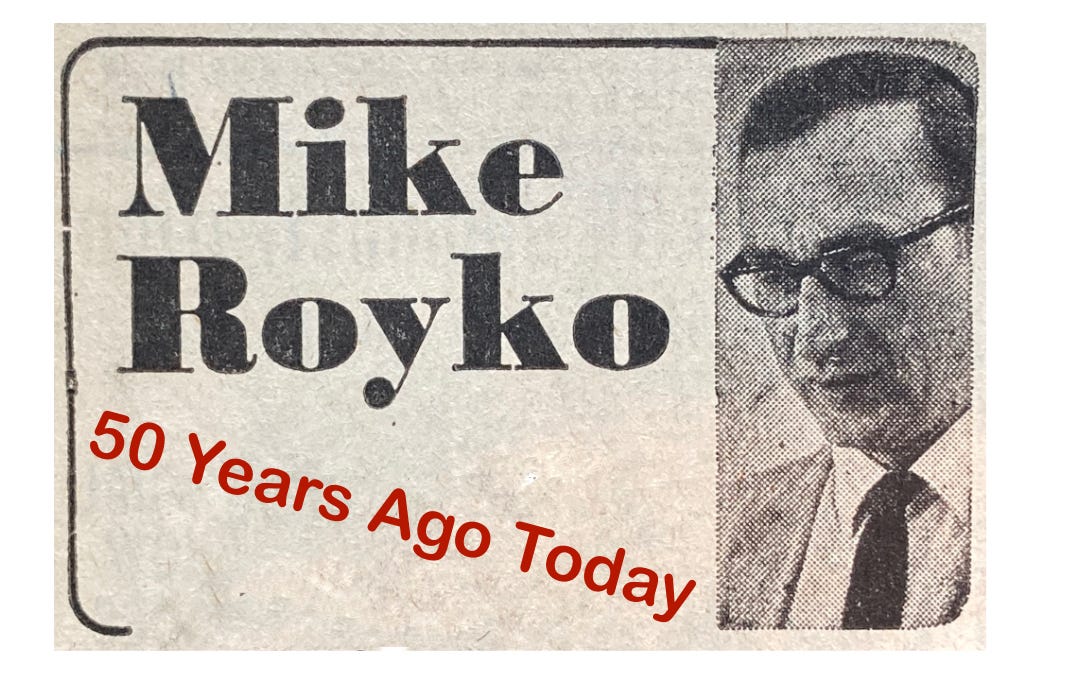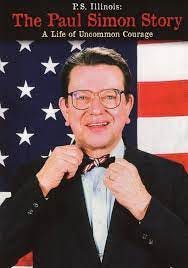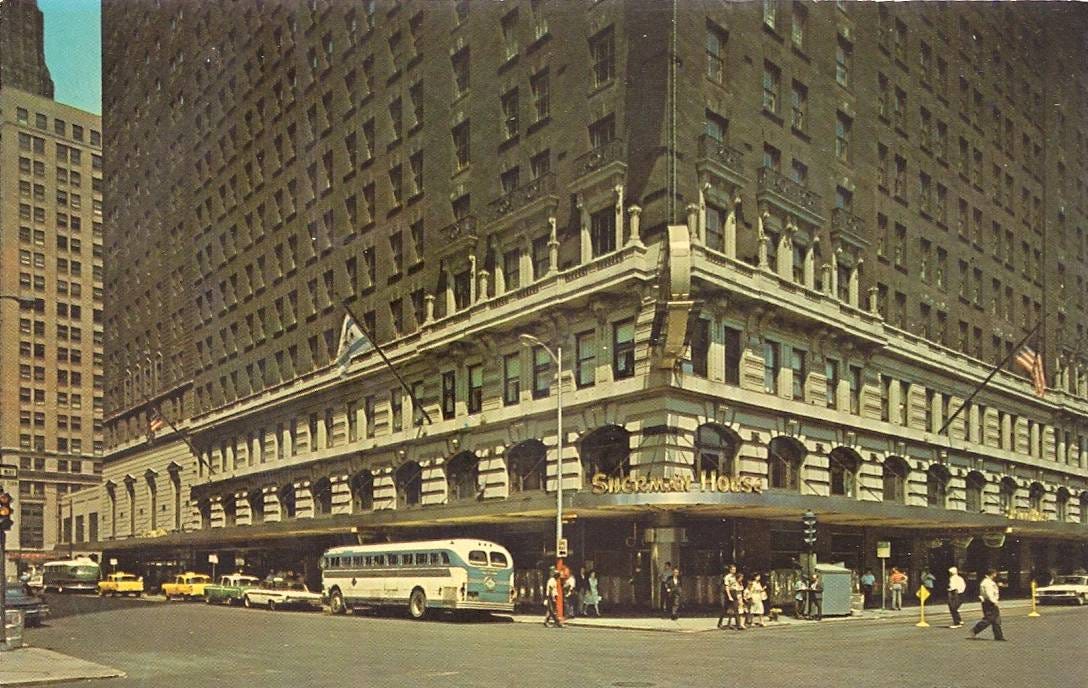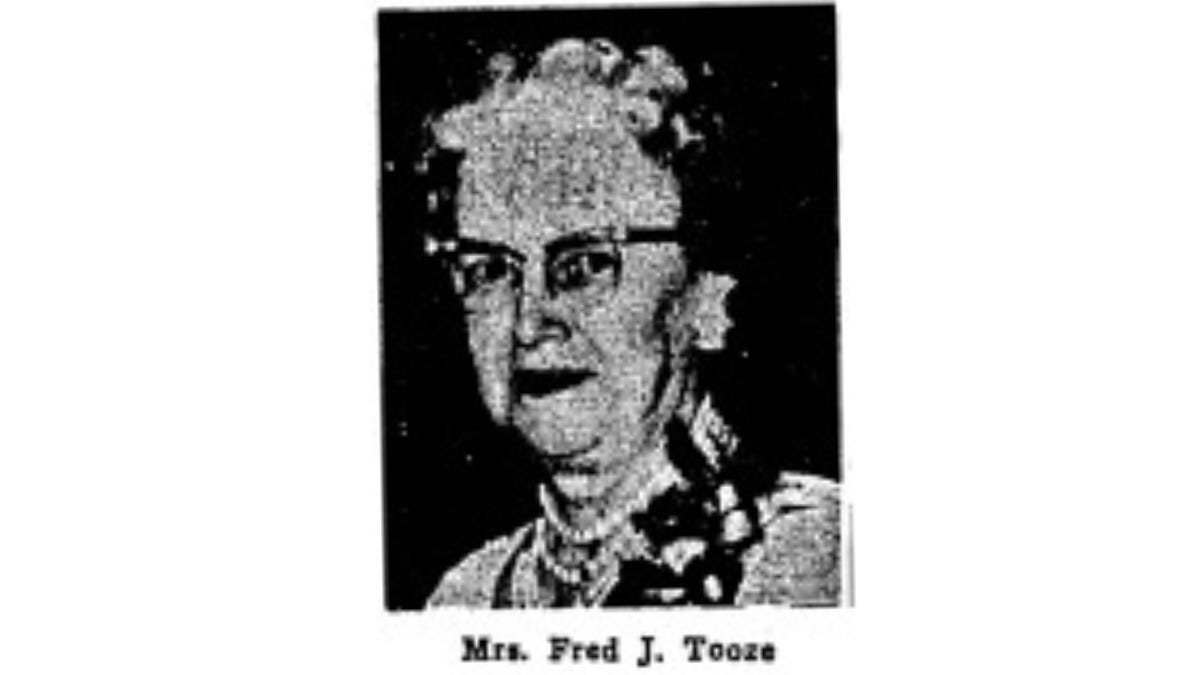Mike Royko 50 Years Ago Today: Mike meets Papa Bear George Halas!
November 29-December 5, 1971
To access other parts of this site, click here for the Home Page.
Why do we run this separate item, Mike Royko 50 Years Ago Today? Because Steve Bertolucci, the hero of the serialized novel central to this Substack, “Roseland, Chicago: 1972,” lived in a Daily News household. The Bertolucci’s subscribed to the Daily News, and back then everybody read the paper, even kids. And if you read the Daily News, you read Mike Royko. Read the daily Royko briefing Monday-Friday on Twitter, @RoselandChi1972.
November 29, 1971
Halas tells 2 that got away
It’s not often Mike Royko is just another fan boy. But how often do you meet Papa Bear George Halas?
Mike goes to a book party for sportswriter George Vass, who’s written a book on the Bears. Nobody pays any attention to Vass because George Halas is there. “Everybody was clustered near a jet-jawed man with wide shoulders, a crooked smile, and a glass of bourbon.”
Mike has always thought he might like Halas, because Halas makes so many people mad. “It stands to reason that anyone who is disliked by a sizable number of Chicagoans must have good qualities. If he is as bad as people say, why hasn’t he been elected to public office?”
Mike is awed by Papa Bear, who “has the chest of a construction worker” and looks 25 years younger than his actual age of 77. Mike asks Halas what day in his long sports career stands out most. Mike admits that it’s “the most trite question you can ask someone in sports”. But he guesses Halas won’t give the usual trite answer. He’s right. Halas pauses, and two people bark guesses:
“’The 73 to 0 game.’ That was the amazing score of the 1940 title game. Somebody else said: ‘Your 100-yard run with the fumble.’ That was when Halas was still a player.”
But Halas shakes his head and says: “That’s easy. It was when I played for the New York Yankees.”
Halas: “’Walter Johnson pitched against us that day. He was in his prime. What a fast ball. Nobody ever threw a ball harder. But that day, I hit two balls over the fence off him.” Halas admits both hits were foul.
Mike considers how pro football is now a national sports craze:
“You might say it was created by George Halas. He brought it from the sandlots to the super-stadiums, and created most of the techniques that make it so popular. But after all that, he says his biggest thrill was the day he hit a couple of long foul balls. Everybody should have their heads screwed on that straight.”
November 30, 1971
How to fight crime rates
“Major” crime is up 11% across the country, but down 2% in Chicago. The real Mayor Daley says it proves we have the best police department and citizens.
“I have a different idea,” says Mike. “We lie.”
Mike notes that crime categories that are hard to fudge, like murder and armed robbery, have gone up just like the national numbers. “But the three other kinds of ‘major’ crime went down, thus giving us our fine over-all statistical record.” That’s attempted burglary, theft over $50, and aggravated assault. Mike thinks he knows why.
“Here are quotations from a written order of the Austin district commander to his men…‘We are presently being charged with many attempted burglaries because of damaged locks, scratched, chipped, or broken door frames and knobs...Incidents of this type should be classified as ‘damage to property’ in the general case report.”
Regarding theft over $50, the Austin commander’s written order says “Just one penny makes the difference. $49.99 keeps it under.”
And re aggravated assault, “Family disputes, intoxicated friends and victims that state they want to forget about the incident…should be classified according to the lesser crime.”
Mike concludes: “It’s nice living in a town where you don’t have to lock your door at night.”
December 1, 1971
Wunnerful plan to help schools
The real Mayor Daley takes over Mike’s column today for a speech on how he’s going to fix the current Chicago schools crisis: Classes may shut down for 12 days due to a $26 million deficit.
Brief background: Daley created the crisis himself last January by giving teachers a raise to settle a four-day strike, with no money to back it up. The Board of Education asked to meet with Daley this past Monday. “We got a lot of ideas but no money,” said one board member afterward.
Now Daley and the Board will meet with Governor Ogilvie. See the December 1 item in this week’s THIS CRAZY DAY IN 1972 compilation for full background on the school crisis, and its connection with Star Wars.
Mike imagines Mayor Daley’s press conference announcement on the issue, with all Daley’s classic tropes, tics and pronunciations. A sampling:
“Ladies and gentlemen, I have called this press conference to announce that we have worked out a program to get money to meet this great crisis and keep our great schools open, so the great children of this city can keep on getting an education from the great teachers of this great city, and so they won’t be running around the streets, even though our streets are as great as any street in any city in this great country, or any country in the world.”
“This program has been worked out with the co-operation of everybody except for those people who do nothing but criticize, and why do they criticize? Because they don’t have any programs of their own, that’s why.”
“First of all, I have instructed all of the city’s aldermen to hold $50-a-plate corned beef and cabbage dinners in their wards. The great precinct captains of all the city’s great wards are gonna sell tickets for these dinners. They don’t have to do this, but every one of the 3,500 precinct captains have volunteered to do this.”
“Another committee is being formed by some of the great construction companies of this wonderful city….These gentlemen have agreed to kick ba…I mean to contribute 2 per cent of any contracts they get from the city…”
“Another committee is being made up of friends of John D’Arco [NOTORIOUS MOBBED UP DEMOCRATIC COMMITTEEMAN], the great leader of the wonderful 1stWard. Out of modesty, these gentlemen don’t want their names known. And they don’t want to say where the money is coming from.”
December 2, 1971
Ed Curdy has a bad morning
Mike usually writes in the first person, but every once in while he writes about a guy in the third person. You may not figure out the guy is Mike until the end. Sometimes it’s because the subject matter is so personal, and other times, like today, it’s just a great read.
“At about 9:30 a.m., Ed Curdy was wheeling his big semi-trailer down the Kennedy Expressway through Chicago,’” Mike starts. It’s rush hour. “The WGN helicopter was somewhere overhead,” which we’ll add means it was feeding info to Wally Phillips and his 1.6 million listeners.
“There probably isn’t a worse moment in the life of urban man, even when traffic is moving,” Mike notes.
Ed Curdy slams on his brakes as he approaches Western, but not fast enough. He rear ends a car, which rear ends another car, and so on. “In a moment the jam formed. It stretched to Belmont, then Addison, then Irving Park, and all the way out to the Edens merger.”
“At Irving Park Rd, a man got out of his Country Squire wagon, stood on the shoulder, shook his head. Nothing was moving as far as he could see…Had he known this was coming, he could have stayed in bed. But he didn’t know, so he got up to the song of the clock-radio, shaved his puffy face, arranged his thinning hair, ate his vitamin pills and headed for the Loop to pursue the good life.”
Mike describes what goes on at the accident scene with a novelist’s eye, including truck driver Ed Curdy. "Mr. Curdy got out and looked stupefied."
Then the column turns into a screed against out-of-town truck drivers who speed through Chicago like they’re still in the middle of Utah. Last year, Mike notes, one such truck driver did that during a blinding snowstorm and described it this way: “It was like doing 40 miles an hour in a crowded parking lot.”
“He didn’t say why he was doing 40 in a blinding snowstorm,” Mike adds. “A woman was killed.”
Mike decries the fact that police don’t keep track of truck accidents separately, or tickets for speeding trucks. “You bet they don’t,” says Mike. “The trucks have a powerful lobby. When have you seen them on the shoulder, getting tickets?”
“Mr. Curdy, standing in the midst of his chaos, didn’t know how much he was hated,” Mike writes. “If there is anything Chicago expressway drivers hate, it is a truck driver. And, with all due respect to Mr. Curdy, with good reason.”
“About five miles up the road, the man got out of his Country Squire again. He looked around, wild eyed and tight-lipped, and shouted four-letter words. In the office when he grunts, everybody jumps. But on a clogged expressway, all men are equal.”
Mike was stuck at Irving Park until noon.
December 3, 1971
Meet your slatemakers
“Daniel Walker wants to be governor, but he refused to go to the Machine’s slatemakers and ask for their endorsement,” Mike starts today. Guess where he's going with this!
FYR (For Younger Readers): Dan Walker is a rare animal, an independent Democrat. He just finished walking across the state—get the pun!—meeting people and drumming up support for a governor run.
As Mike notes, Walker refused to go through the normal process to run as a Democrat: Humbly appear before the real Mayor Daley’s slatemaking committee and beg for the Machine’s endorsement.
Two days ago, the papers were full of Dan Walker and Lt. Gov. Paul Simon trading insults because Simon is going all-out to get Daley’s nod with the slatemakers.
That may shock some older readers, who will remember Paul Simon as our U.S. Senator for almost 20 years, a man with a sterling, good government, liberal reputation. But Simon was also a politician, besides having monstrous ears and always wearing a bow tie.
Quick story, I once attended a Democratic fundraiser dinner for Simon at the Leona’s that used to be just north of Belmont on, I think, Sheffield. I went as a favor to a friend with tickets. It was in the late ‘80s or early ‘90s. Paul Simon came around and shook everybody’s hands. He got to me just as I put down a frosty cold glass of water. As he shook my hand, he boomed in that Paul Simon delivery, “Cold hands but a warm heart!” But back to 1971.
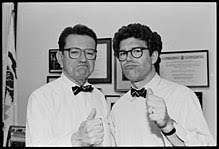
Anyway, Walker said going to the slatemakers was selling out to Mayor Daley. “In taking the slatemaking route, you cannot clean up the race track mess, you cannot put an end to the lingering ties, and you cannot meet people’s needs because machine needs comes first,” said Walker. Previous Illinois Governor Otto Kerner is about to get indicted for that “race track mess,” which is a bunch of race track stock offered to various politicians for low prices in exchange for favorable legislation. Spoiler alert, Kerner will go to jail.
Here is a picture of Dan Walker with Mayor Daley in the background. Don't know the context but naturally, Daley doesn't look happy to be there.
Paul Simon called Walker’s comments “Joe McCarthyism” trying to scare voters, and claimed he made “no commitment to anyone” by asking for Mayor Daley’s blessing.
Downstate Democratic slatemakers have been meeting this week at Springfield’s St. Nicholas Hotel, where deceased and disgraced Illinois Secretary of State Paul Powell hid $750,000 in small bills, much of it in an old shoebox, in his hotel room closet. Powell was central to the “race track mess” Walker mentioned that will send former Illinois Governor Otto Kerner to jail. You just can’t make up these connections. Nobody would believe it in a movie.
The Paul Powell rundown provided in our look at Mike’s November 9 column:
For younger readers, Paul Powell is perhaps the most notorious of Illinois’ notoriously corrupt politicians. A Democrat, he was Speaker of the House of Illinois’ House of Representatives for decades before ascending in 1965 to Secretary of State until his death in 1970.
In just his hotel room closet, they found $750,000 in small denominations--enough of it stuffed into an old shoebox that this is Paul Powell’s enduring legacy. His estate was $3 million plus a shady 61,290 shares of stock in seven Illinois racetracks, though Powell never made more than $30,000/year.
Mayor Daley’s Cook County Democratic Central Committee’s slatemaking group meets in the Emerald Room at the Sherman House hotel, across from City Hall.
At least it’s not Paul Powell’s old place. But as Mike will recount, the group at Sherman House isn’t much more savory.
Back to Mike:
“[Dan Walker] says some of these men [Daley’s slatemakers] are unsavory characters, and he doesn’t want to associate with them. I’m surprised that he feels that way. The slatemaking committee is made up the elder statesmen of the Cook County Democratic Organization….Judge for yourself. Here is a sampling of the committee:”
Now Mike describes the illustrious background of the party hacks and mob associates who sit on the slatemaking committee. A few excerpts:
“John D’Arco, who runs the famous 1st Ward organization, has never been accused of anything more serious than taking his orders from the Mafia….He is a familiar sight in many of the Near North Side’s flashier restaurants, where he enjoys eating olives and spitting out the pits so they go ‘ping’ on the plate.”
Note: Should you think Mike exaggerates, I’ll mention that in getting the picture of D’Arco below, I found a 1956 Trib article headlined “400 MOURNERS PASS GANGSTER GUZIK’S BODY. The lede: “About 400 mourners, including Ald. John D’Arco [1st], paid their final respects last night to Jack Guzik, 69, financial brains of the crime syndicate.”
“Assessor P.J. (Hi Keed) Cullerton. Everybody knows who he is. If you don’t know, stay out of the real estate business.” Take Mike’s word for it—we could be here all day if I explained P.J. Cullerton.
“Ralph (Babe) Serpico….Serpico says he doesn’t have any connection with the Syndicate. How did he know, when he went on that free junket to a Puerto Rico gambling casino, that Tony Accordo and other hoods were going too?”
U.S. Rep. Dan Rostenkowski; George Dunne, ward boss and future long-time President of the Cook County Board; State Sen. Bernie Niestein: All own some of that dirty race track stock associated with Paul Powell. Rostenkowski is embarrassed about it. Neistein “has never been accused of anything more serious than taking orders from Chuckie English, of the crime syndicate.”
“Vito Marzullo has never lost an election as alderman. In fact, nobody has ever run against him…Besides being an alderman, Marzullo is an undertaker. Even in death, there is no escaping the Machine.”
Mike concludes he doesn’t understand why Dan Walker wouldn’t want to “go into a smoke-filled room” with these men. “There’s nothing for him to be nervous about. Before he goes in, he can always check his valuables with the room clerk.”
FYR: Walker would win the upcoming election, serve one term as governor, and lose the office to Jim Thompson. Ten years later Walker would go to jail for federal bank fraud and perjury. The judge who sentenced him said Walker used a savings and loan he owned as his “own personal piggy bank”. But at least he didn’t ask for the endorsement of Mayor Daley’s Cook County Democratic Central Committee.
December 4-5, 1971
The Holiday Spirits of Mrs. Tooze
As we here all know, weekends could be sad for a Daily News family because Mike Royko wasn’t in the Daily News’ single weekend edition. So we look for Mike elsewhere on weekends.
Last week we looked at a physical copy of Mike’s first book of columns, “Up Against It,” as well as the dedication to Daily News editor Larry Fanning, who first gave Mike a column; and the introduction by Pulitzer Prize-winning editorial cartoonist Bill Mauldin. Today, let’s look at the first column in the first book.
This is a column that would get Mike in big trouble today. There’s gonna be plenty of those, of course, so it’s fitting that the first collected column falls into that category.
“Mrs. Tooze is nagging again. It’s enough to drive a man to drink when she gets going,” he starts.
Mrs. Tooze is president of Evanston-based Woman’s Christian Temperance Union, a group that helped pass Prohibition, and kept Evanston free of bars and liquor stores until surprisingly recently. It’s hard to believe she wasn’t named by Charles Dickens. In fact, when I typed “Tooze” into the Tribune archives, autocorrect changed it to “booze”—and Mrs. Tooze makes 15 Trib appearances in just four years, which I guess is why Mike says she’s nagging “again.”
Re Prohibition, Mike points out, the W.C.T. U. “didn’t accomplish much besides putting Al Capone in the bootleg business and getting the modern crime syndicate started.” Yet, he says, they still hope for a new Prohibition.
Among other politically incorrect observations, Mike says the WCTU doesn’t seem to realize that a new Prohibition might decrease wife-beating, but increase husband-wife homicides.
“As a man who lived in the flat upstairs used to say, when his wife lectured him: ‘This bottle is your best friend. It slows down my reflexes so’s I can’t deliver a fatal judo chop.”
“Mrs. Tooze’s latest message, prompted by the coming holiday season, is full of information that she assumes is startling and frightening,” says Mike. Mrs. Tooze has pointed out that there are 425,000 taverns and liquor stores in the U.S., and that several thousand billion gallons of spirits are sold every year.”
Mike thinks these are good things. You should be able to threaten your bartender that you’ll take your business elsewhere, “And with 424,999 other places, this is no idle threat.”
Mike Royko’s book compilations don’t include column publication dates, which always drives me nuts. But I believe I found the year Mrs. Tooze issued her plea for a dry New Year’s, via the Tribune archives: “W.C.T.U. Head Asks Dry Holiday Parties,” from December 29, 1966, with a large picture of “Mrs. Fred J. Tooze.” The mental picture you already have of Mrs. Tooze is exactly correct.
That year, Mrs. Tooze specifically urged women to pass up alcohol not just on New Year’s Eve, but to “reject alcoholic beverages in a New Year’s pledge for sobriety.” Mrs. Tooze claimed alcoholism was increasing among women. “There is no way of predicting what casual drinker will become an alcoholic, and every alcoholic in or out of jail or an asylum was once a ‘casual’ drinker,” Mrs. Tooze said.
“’If one asks on New Year’s Eve, “What harm is taking a drink?,” she might well remember that the 12,226 women mental inmates once asked the same question,’ Mrs. Tooze said.”
Also, re alcohol, “Celebrating with it results only in hangovers and tragedy rather than in prosperity and happiness.”
Mrs. Tooze was probably a perfectly nice, completely sincere woman. But you can see why Mike had to make fun of this. I hope she had a great sense of humor about it and cut the column out to stick on her refrigerator with a magnet. I bet she did.
By the way, this feature is no substitute for reading Mike’s full columns. He’s best appreciated in the clear, concise, unbroken original version. Mike already trimmed the verbal fat, so he doesn’t need to be summarized Reader’s Digest-style, either. Our purpose here is to give you some good quotes from the original columns, but especially to give the historic and pop culture context that Mike’s original readers brought to his work. You can’t get the inside jokes if you don’t know the references. Plus, many columns didn’t make it into the collections, so unless you dive into microfilm, there are some columns covered here you will never read elsewhere. If you don’t own any of Mike’s books, maybe start with “One More Time,” a selection covering Mike’s entire career and including a foreword by Studs Terkel and commentaries by Lois Wille.
Do you dig spending some time in 1972? If you came to MIKE ROYKO 50 YEARS AGO TODAY from social media, you may not know it’s part of the book being serialized here, one chapter per month: “Roseland, Chicago: 1972.” It’s the story of Steve Bertolucci, 10-year-old Roselander in 1972, and what becomes of him. Check it out here.
To get MIKE ROYKO 50 YEARS AGO TODAY in your mailbox weekly along with THIS CRAZY DAY IN 1972 and new chapters of the book—
SUBSCRIBE FOR FREE!



